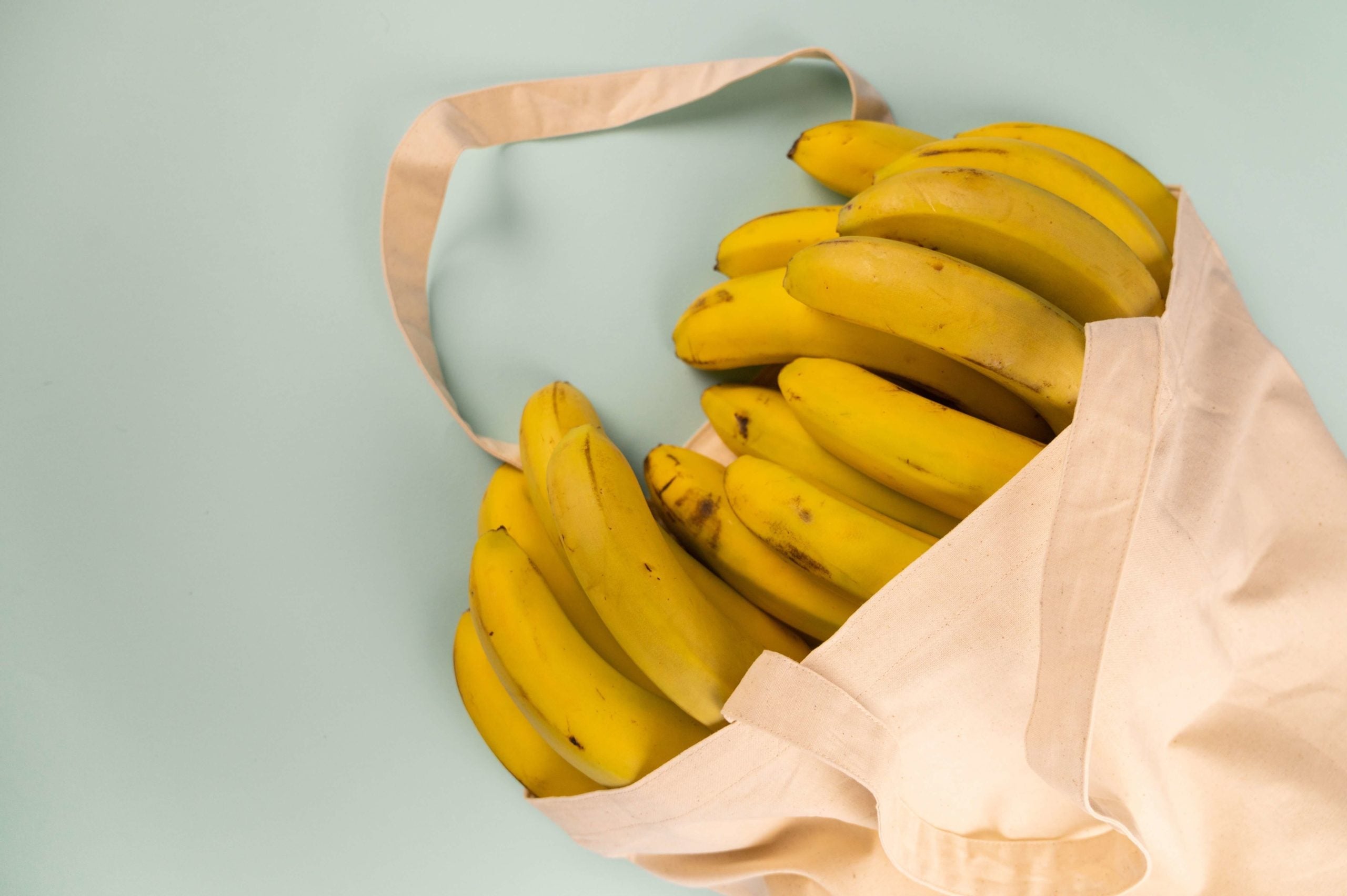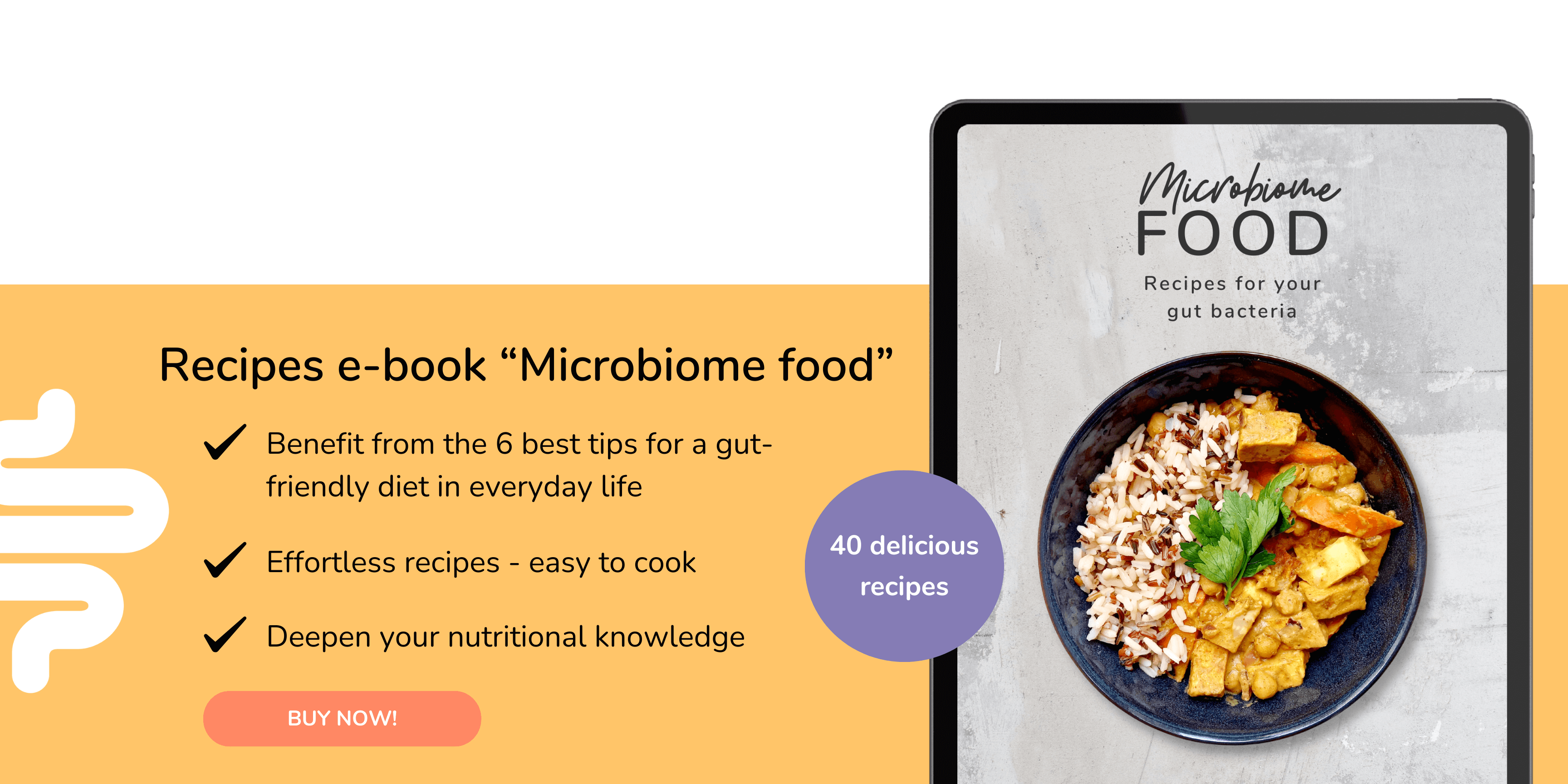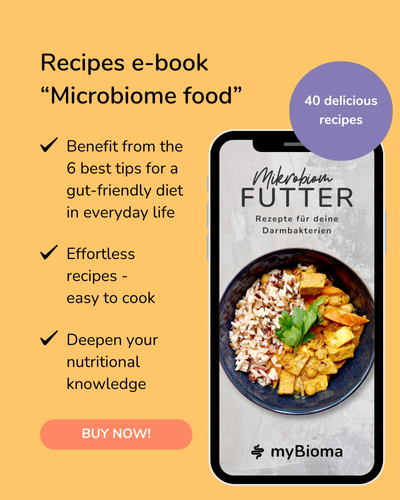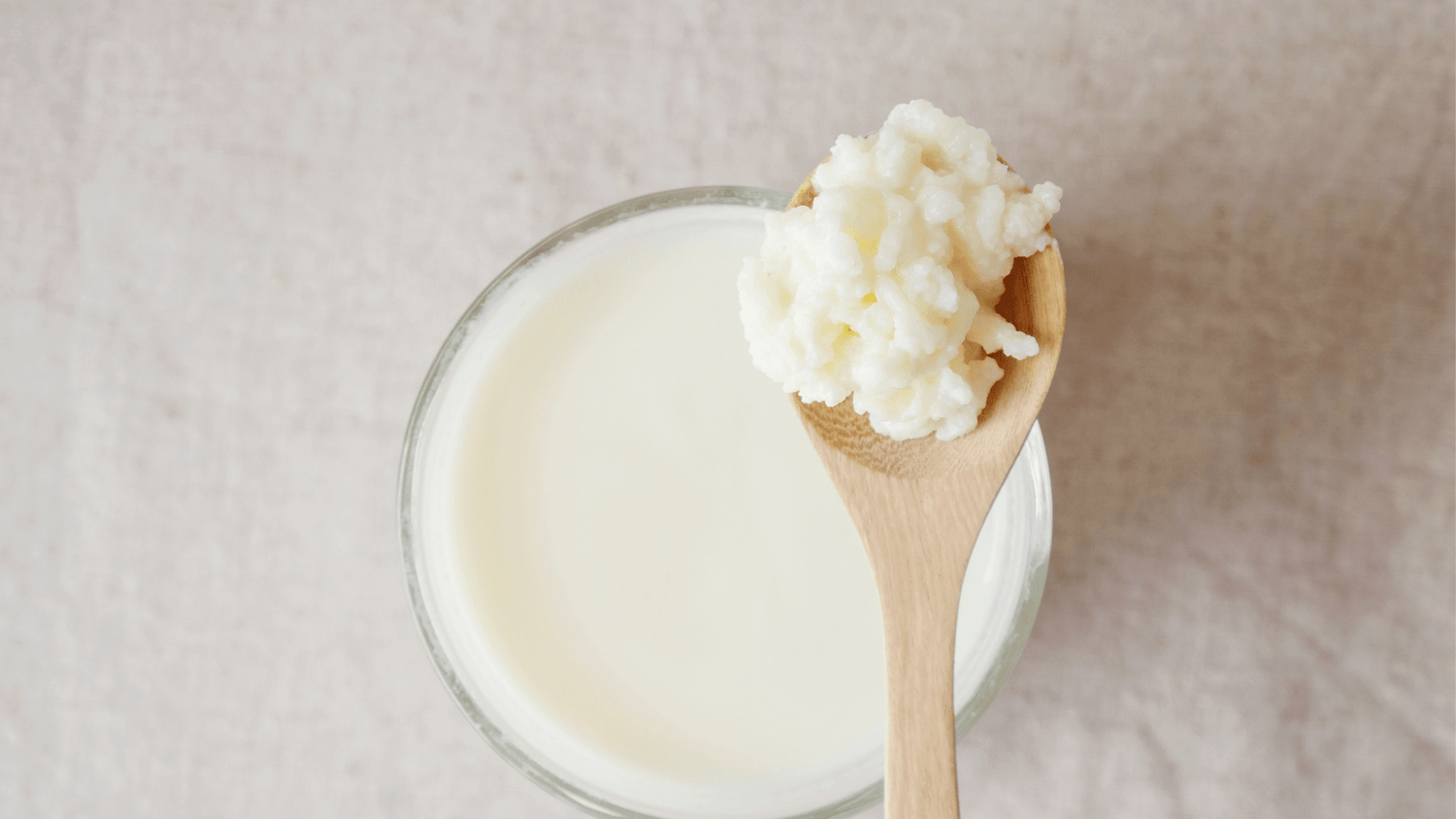Table of contents
- First of all, a small list of how versatile bananas are on our body:
- Are bananas healthy for the gut?
- What are the nutritional values of bananas?
- Bananas and their dietary fiber content:
- Do bananas help with diarrhoea and flatulence?
- Bananas and their effects on constipation
- Different states of ripeness of bananas
- How many bananas a day are healthy?
- Bananabread (glutenfree, vegan) ingredients:
- Preparation
Bananas: Everyone knows them and it is impossible to imagine our household assortment without them as a quick snack for in between. But what do the curved, yellow fruits have to do with our microbiome? That's what we want to find out together with you today.
Did you know? To develop optimally, bananas need a warm, humid climate and a temperature of around 27 °C. If possible, 1,500 hours of sunshine per year or more and high humidity are further requirements. The banana plant grows best in shallow, well-aerated and sandy loam soils.
First of all, a small list of how versatile bananas are on our body:
- They quickly energise you at any time of day.
- They contain abundant potassium .
- They improve your digestion .
- They are a mood booster .
- They serve as an affordable, convenient and healthy snack .
- They are a good source of manganese.
- They help to improve kidney function.
- They support heart health .
Bananas are often demonized for their Sugar content demonized. However, it should be noted here that A) it depends on the ripeness of the fruit and B) as with everything, the amount also plays a role. plays a role. We will discuss the former later in our post.
Are bananas healthy for the gut?
Bananas contain fibre and phytochemicals that promote the growth of good bacteria and a healthy gut. Bananas also have a soothing effect on digestive problems such as diarrhoea or flatulence and prevent constipation.
Bananas also have a positive effect on other organs: thanks to the potassium they contain, bananas promote good heart and kidney health. The antioxidants they contain protect the entire organism from oxidative damage.
What are the nutritional values of bananas?
Bananas are very nutritious! We have summarised the nutritional values of bananas for you in the table below. The quantities given refer to 100g of banana. On average, a banana contains around 120g.
| Calories | 93 kcal |
| Protein |
1,15 g |
| Fat |
0,18 g |
| Carbohydrates | 20 g |
| Fiber |
2 g |
| Vitamin A | 0 μg |
| Vitamin E | 0,27 mg |
| Vitamin C | 11 mg |
| Folate | 14 μg |
| Sodium | 1 mg |
| Potassium |
367 mg |
| Calcium | 7 mg |
| Magnesium | 30 mg |
| Iron |
0,35 mg |
Bananas and their dietary fiber content:
As you already know as a microbiome expert, dietary fibres are the best friends of an intact intestinal mucosa. Fibre is generally divided into water-soluble and water-insoluble fibres . Water-insoluble fibres are not digested by bacteria. However, they are thoroughly wiped through and thus stimulate digestion. Water-insoluble fibres can be found in various types of cereals and fruit.
Water-soluble fibre is broken down by bacteria in the large intestine. Among other things, this produces short-chain fatty acids that feed your good bacterial flatmates. In addition, this fibre swells up in the intestine and thus facilitates intestinal transit. Various types of fruit, oats, barley and pulses (beans, lentils and chickpeas) contain water-soluble fibres.

The effects of inulin on our body.
Inulin, pectin and resistant starch - the miracle weapons of bananas
Bananas contain a lot of inulin. This water-soluble fibre has a particularly beneficial effect on the growth of anti-inflammatory intestinal bacteria and increases the number of beneficial bacteria in the intestine. Inulin can also support the absorption of vitamin C, normalisation of cholesterol levels and long-lasting satiety.
Fibre has many benefits for our microbiome and therefore also makes bananas healthy. Although bananas are not one of the most fibre-rich types of fruit, they do contain 2 grams of fibre per 100 grams. Bananas contain the fibre pectin and resistant starch in particular.
Resistant starch passes through the small intestine undigested and is broken down (fermented) in the large intestine by your intestinal bacteria in the absence of oxygen. The short-chain fatty acids mentioned above, more precisely propionate, acetate and butyrate, are formed in the process. Butyrate is the main source of energy for the cells of the colon mucosa.
Resistant starch is mainly found in cooked and re-cooled rice, pulses (beans, chickpeas and lentils) and potatoes. The starch ensures good satiety and stimulates digestion as it swells with liquid and increases the volume in the intestine.
As you can see, bananas can optimally support your bowel movements thanks to the fibre they contain and promote good digestion .
Do bananas help with diarrhoea and flatulence?
The answer is yes! As a healthy snack, bananas can also help with diarrhoea, as the pectins they contain delay bowel movements. They also supply the body with magnesium. The best way to do this is to mash the banana with a fork before eating it. Some studies have also shown that pectins can have a preventative effect against bowel cancer. Bananas can therefore improve the health of your digestive system and help to reduce flatulence, for example.
In one clinical study, a group of overweight women were asked to eat a banana twice a day as a snack before meals for 60 days (overweight people have less good gut bacteria, which can even contribute to weight gain). During the study, gut bacteria levels were then measured and digestive symptoms recorded to see if eating bananas made a difference.
Indeed, this led to an increase in good bacteria (bifidobacteria) and a significant reduction in bloating. Previously, the women taking part in the study suffered from bloating almost every day, but adding bananas to their diet halved the symptoms. "We concluded that daily consumption of bananas can induce bifidogenesis in healthy women with body weight problems," commented the researchers of the study.
Bananas and their effects on constipation
There are many different opinions in this regard: Bananas are said to have a constipating effect, while others claim that they can cause diarrhoea. So what is really true, and can bananas actually help with constipation?
Here too, the answer is yes! The pectin contained in bananas is a real all-rounder for good digestion and not only helps with diarrhoea, but can also alleviate constipation. It may sound paradoxical, but pectin has the opposite effect on constipation as it does on diarrhoea and can change the consistency and transit time of stools so that those affected can have more frequent bowel movements again. Ripe bananas are the most effective here.

Ripe bananas can help support digestion.
Different states of ripeness of bananas
To come back to the different ripening To come back to the different ripening states of the yellow fruit, we have listed the benefits of each of the three ripening stages for you in a nutshell:
- Unripe bananas contain the most prebiotic carbohydrates (resistant starch), as these have the least sugar. Thus, here is also the most good food for your bacteria. In addition, resistant starch makes you starch makes you feel fuller for longer, which can help you lose weight.
- The riper a banana becomes , the more its sugar content increases. its sugar content. Ripe bananas are therefore not only a great natural source of energy source, but also easier to digest. When they are unripe, they serve they serve as prebiotics for your intestinal flora. As the fruit softens, it becomes easier to easier to digest them optimally. That's why a ripe banana is the most most likely to relieve flatulence.
- Finally, a ripe banana contains more antioxidants than an unripe banana. Antioxidants are important for fighting off free radicals. This in turn can help your body support your immune system in its work.
- When the skin of a banana turns brown, we tend to throw it in the bin, but this is often wrong, because they still contain many vitamins and minerals. If you still don't like overripe bananas, use them for baking. They are a great binding and thickening agent. Furthermore, the higher sugar content provides a pleasant and healthy sweetness.
How many bananas a day are healthy?
The German Nutrition Society recommends eating around 250g of fruit a day. This corresponds to a little more than two bananas. However, to ensure a diverse and gut-friendly diet, it's advisable not to solely rely on bananas daily, but rather to indulge in an assortment of fruits and berries. Nevertheless, feel free to include 2-3 bananas on some days without worrying!
Bananabread (glutenfree, vegan) ingredients:
- 2 flaxseed "eggs" (mix 2 tablespoons of ground flaxseed with 5 tablespoons of water, stir everything together and let stand for 10 minutes).
- 3 medium bananas
- 1/3 cup (80g ) almond butter
- 1/3 cup (65g) coconut blossom sugar
- 1 tablespoon coconut oil
- 1 teaspoon bourbon vanilla
- 2 teaspoons apple cider vinegar
- 1 2/3 cups (150g) oat flour
- 1.5 teaspoon baking powder
- 1.5 teaspoon baking soda
- 1 teaspoon cinnamon
- 1/4 teaspoon salt
- (Rice) chocolate lentils/nuts/raisins as desired
Preparation
- Preheat the oven to 180°Celsius and line a baking dish with baking paper. I used an oblong baking dish (24x11cm) from IKEA.
- The next step is to prepare the flaxseed "eggs": mix 2 tablespoons of coarsely ground flaxseed with 5 tablespoons of water, stir everything together and leave to soak for 10 minutes.The next step is to prepare the flaxseed "eggs": mix 2 tablespoons of coarsely ground flaxseed with 5 tablespoons of water, stir everything together and leave to soak for 10 minutes.
- In the meantime, you can mash the ripe bananas in a large bowl.
- Then stir in the almond butter, coconut blossom sugar, coconut oil, vanilla and apple cider vinegar.
- In its separate bowl, mix the oat flour, baking powder, baking soda, cinnamon and salt.
- Now combine the dry ingredients with the wet ingredients and mix them well.
- Now add the prepared flaxseed "eggs".
- Also add the nuts/raisins/chocolate lentils and incorporate into the mixture.
- Pour the batter into the baking tin and optionally top with more nuts/raisins/chocolate lentils or banana pieces.
- Bake for 45-50 minutes and pierce with a wooden stick on a trial basis to check that it stays clean. Halfway through baking (20-25 minutes), the banana bread should be covered with foil to keep it nice and moist.
Have fun trying it out!
Looking for more gut-friendly recipes? Discover our recipe books for new culinary inspiration!
References
- Mitsou EK, Kougia E, Nomikos T, Yannakoulia M, Mountzouris KC, Kyriacou A. Effect of banana consumption on faecal microbiota: A randomised, controlled trial. Anaerobe. 2011 Apr 16. [Epub ahead of print]
- Englyst, H., Kingman, S., Hudson, G., & Cummings, J. (1996). Measurement of resistant starch in vitro and in vivo. British Journal of Nutrition, 75(5), 749-755. doi:10.1079/BJN19960178
- Olano-Martin, E., et al. (2003). “Pectin and pectic-oligosaccharides induce apoptosis in in vitro human colonic adenocarcinoma cells.” Anticancer Res 23(1a): 341-346.
- Iwasawa, H.; Yamazaki, M.; (2009). “Differences in Biological Response Modifier-like Activities According to the Strain and Maturity of Bananas.” Food Sci. Technol. Res., 15 (3), 275 – 282
- https://draxe.com/nutrition/banana-nutrition/
- https://de.wikipedia.org/wiki/Bananeng%C3%BCrtel
- https://www.gesundheitswissen.de/ernaehrung/ballaststoffe/
- https://www.verywellhealth.com/the-health-benefits-of-inulin-4587258
- Ding, C.; Ge, X.; Zhang, X.; Tian, H.; Wang, H.; Gu, L.; Gong, J.; Zhu, W.; Li, N. Efficacy of Synbiotics in Patients with Slow Transit Constipation: A Prospective Randomized Trial. Nutrients 2016, 8, 605. https://doi.org/10.3390/nu8100605
- Singh, B. et al. (2016) ‘Bioactive compounds in banana and their associated health benefits – A review’, Food Chemistry, 206, pp. 1–11. Available at: https://doi.org/10.1016/j.foodchem.2016.03.033.
- https://www.dge.de/gesunde-ernaehrung/dge-ernaehrungsempfehlungen/dge-ernaehrungskreis/obst/







